


For many Malagasies, traditional small-scale farming is their only source of income. With the country’s population rising sharply, the natural environment is under increasing pressure.
The population of Madagascar is expected to double to 50 million in 2050
The average Malagasy family consists of two parents and four children
of Malagasy people live below the poverty line
people live in rural area in Madagascar
A year in the life of a vanilla farmer
For rural communities dependent on farming, financial uncertainty is a fact of life. We’re seeking to understand the impact of this uncertainty and improve farmers' livelihoods. This begins with understanding everything they do, month to month.
In 2006, we became the first flavour and scent company to have its own operations in Madagascar. From the outset we were committed to working with the local farmers and their communities to establish a supply chain that created shared value for everyone involved.
We have direct partnerships with 7,000 farmers
Over 30,000 people benefit directly or indirectly from Symrise’s activities
Since 2018, we’ve distributed over 452,000 seeds and trees for reforestation
Increasing food security
While the SAVA region of Madagascar, where we operate, has enough to eat year round – largely thanks to the benefits brought by vanilla – the same is not true across the rest of the country.
Malagasies eat more rice per person than anyone else in the world. It‘s usual for families to eat rice three times a day, occasionally accompanied by vegetables or broth. Meat is a luxury for almost all people in Madagascar.
Although most of the year there is enough to eat in the SAVA region where Symrise operates, the same is not true across the rest of the country. Most people’s diets are not very varied, which can lead to malnutrition, particularly in children. Helping farmers to increase the range of crops they grow is one way to help combat this.
The need for food can drive farmers to sell their crops at discounted rates in advance of the vanilla harvest for ready cash to unofficial buyers. We’ve been rolling out Farmers Business Schools program in each village. This comprehensive training, the diversification of incomes and advice by our team throughout the year allow farmers to decide by themselves what strategies they can put in place to make the most of their vanilla income.
We provide farmers with rice supplies on credit during the lean season so they don’t need to sell their vanilla beans early at reduced prices.
We’re helping farmers to grow additional crops on their vanilla plots, reducing their reliance on the vanilla harvest and providing additional income without contributing to deforestation.
We support farmers to market a variety of crops growing on their diverse farming systems: cocoa, cloves, cinnamon, mandarin. These crops provide extra income. We promote ginger, patchouli crops with proper agronomical advises to maintain soil fertility.
Supporting farmers to diversify the range of crops they grow is essential to increasing their financial security, as it reduces their dependence on their vanilla crop. Vetiver is multipurpose: cash crop, use to fight soil erosion, handcraft. By harvesting only some of the vetiver each year, this versatile plant serves the needs of both people and planet.

It took five or more of us about 10 minutes to dig out just one vetiver grass. Being in Madagascar really makes you realise just how hard the farmers work.
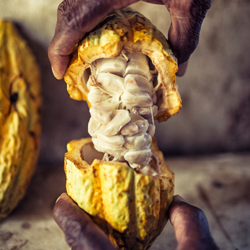
Cocoa has always been a major export of Madagascar, one of the few locations where the Criollo, a variety appreciated for its texture and flavour, is grown.
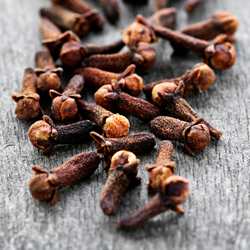
Often used as an ingredient in pickling spice blends, syrups for poaching fruits, and in spice blends for making mulled cider or wine, cloves are a versatile spice.
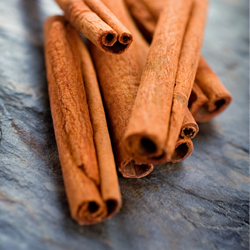
Cinnamon is a favourite holiday spice, perfect for Christmas cookies and mulled wine. Cinnamon from Madagascar is quite different from Chinese Cinnamon (Cassia) being both sweeter and more delicate.
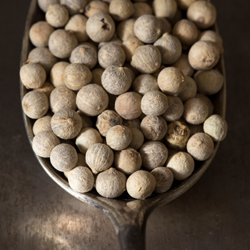
Malagasy pepper is one of the world's rarest peppers. Less spicy than black pepper, it retains the typical aromatic base but with a distinctive flavor and aroma, with fruity, citrus and floral notes.
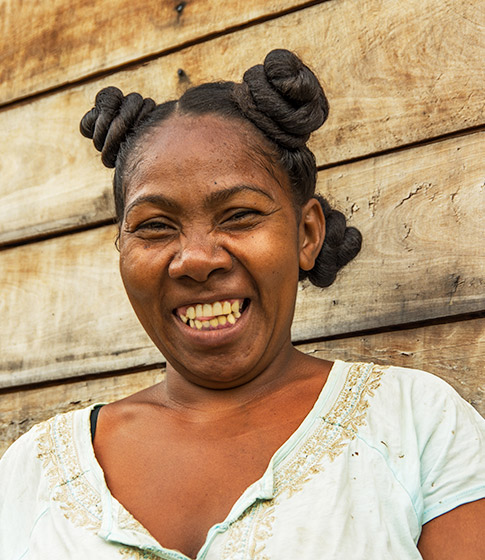
Judith Fredette Tabavy is a vanilla farmer and mother of two. From the outside, Judith’s hut looks like many others in Mandena; wooden walls, a curatin instead of a door, the kitchen outside the house. But behind the house, there's a difference. Tiny clove seedlings are growing in plastic pots under a wooden frame, protected from the scorching sun by bamboo branches.
These will one day provide additional income to farmers who have traditionally been heavily dependent on the vanilla harvest, all as part of our initiative to help farmers diversify their crops and improve both their soil and livelihoods. Another major benefit of the alternative crops is that they offer farmers an income source that’s available year-round. The scheme has been a hit with the farmers, who Judith says have welcomed the project with open arms.
When the plants are the right size, the farmers can put them out in the fields and will be able to offer a new product in four to five years.
Through a combination of Farmer Field Schools and Farmer Business Schools all our partner farmers have access to training in sustainable farming practices, and soil management so they can pass this knowledge on to the other farmers in their communities.
The population of Madagascar is growing at a rapid pace. The fragile educational system, however, is subject to increasing spending cuts. As part of our commitment to creating sustainable communities, we support education in the villages where the vanilla farmers live.
We’re working in local communities to improve primary school pass rates.
One of the big problems facing schools across Madagascar is the cost of employing teachers. Parents’ associations will often take on this task, which leads to high costs for large families and is one of the reasons for declining school attendance rates. Books and other materials are also often rare.
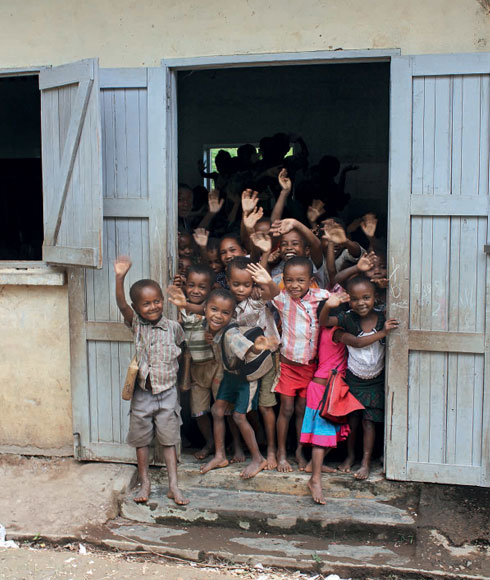
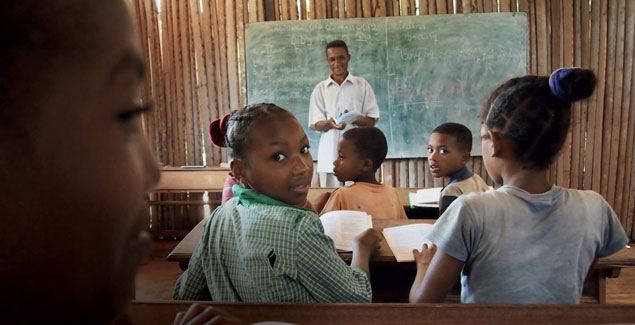
We want to give the families better future prospects. A good education helps in two ways; either the young people use their knowledge to assist their families’ operations, or they find a well-paid job and support their families in this way.
We support financially public primary schools parents’ associations (FRAM) in each village and enhance the capacity of board members in managing the annual funds for good purposes (rehabilitation, provision of materials, extra teachers)
5 MFRs in Antalaha, Sambava, Andapa are now operational, these schools welcome young people who previously dropped out of schools and educate them in rural and agricultural skills
By subsidizing Maison Familiale Rurale schools, we’re helping young people through education that mixes formal learning with practical experience. This ultimately helps young adults who want to assist on their family farms or start out on their own.
5000 households benefit from the Mahavelona mutual health insurance in the sava region.
Symrise set up the first health insurance scheme for farmers in 2010 in Diana and 2013 in SAVA. Today around 15,000 Housesholds are fully covered for all their hospital expenditures, part of their doctor consultations & medicines.
The insurance scheme is called Mahavelona – it is unique in the SAVA and has a strong impact on resilience: farmers don’t need to ask a credit or sell their assets to be admitted to hospitals; it is breaking the vicious circle of health induced poverty and poverty induced poor health.
Improving education and access to healthcare among vanilla farmers are important objectives in themselves – but they are not philanthropy. We believe that these programmes create shared value, for us as well as the communities we work within.
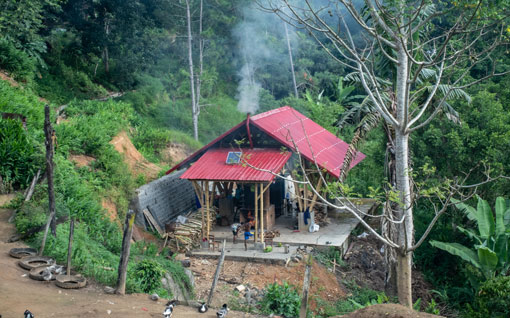
Through programmes like these we hope to transform the vanilla supply chain from one in which farmers are vulnerable to price fluctuations and poor harvests and trapped by poverty, into one in which farmers have a secure livelihood and a higher standard of living, so that they can consistently produce the premium vanilla that is such a vital ingredient for us.
We had a vision of establishing the entire supply chain, from cultivation to extraction, in Madagascar and in the most sustainable way possible. This vision has been realised, but we’re not going to rest on our laurels. We will continue to rely on the experience of the farmers and our employees to further expand our reach, and we will continue our work to improve the living conditions of farmers and the communities they live and work in.
By improving standards and achieving accreditation, we will be able to bring a higher-quality, fully traceable product to our customers – who increasingly demand that their ingredients can be shown to be sustainably sourced, not least because their consumers want the same thing.